Let’s talk about sexual health research!
I’m excited to say that since April this year, I’ve had the privilege of co-researching alongside 25 others to formulate questions and ways of understanding Two-Spirit, Lesbian, Gay, Bisexual, Transgender Queer, Questioning, Intersex, Asexual and those not reflected in the acronym but who identify within the Queer spectrum (2SLGBTQQIA+) at the University of Toronto School of Social Work.
Created by the Community Based Research Center (CBRC) in Vancouver, “InvestiGAYtors 6.0” stands as the 6th successful group process of integrated community based research that employs public interest as compass in research design.
I made a goal earlier in the year: contribute to a queer focus group in a formal setting. It brings my interests together in a new way.
My reader/writer practice is mostly gestures of my self-publishing or my design media consultancy where I support dissertation writing services. I’ve often questioned this shy circumspection of further academic engagement while valuing education in general. This change became a goal for this year.
To spark our creativity, the Program Coordinator Erik J. Van Giessen organized a tour of speakers who were equipped to give us keys to important frameworks for the research along the journey. These were engaging talks that brought forth a lot of reflection for me. I’ll share three of them with you.
The first thing we had to understand was data. As a Black Queer individual, a main point in my understanding of continued health disparities in Canada (despite data collection continuing from the 90s) is the ethnicity data gap. Our guest speaker was Barry D Adam, the Distinguished Professor Emeritus of Sociology at University of Windsor who contextualized this with slides of data collected between 2018 and 2022 for a study titled “Number of first-time HIV diagnoses by race/ethnicity” :

Looking at the bar chart confirms 2 stories: firstly, that there is a downward trend in diagnoses meaning positive policy implementation. Secondly, however, the data for white diagnoses is overrepresented. It describes the stark disparities of outcomes of care for those from racialized communities who are able to access it. This was my introduction to syndemic theory. It’s the idea that social and structural issues interact with diseases to negate achievements of health research and care delivery. Minority Stress Theory as it applies to sexual health, a coinage inspired by intersectionality theory.
Our second speaker instructed us on how the surveys were to be shared in the summer at Toronto Pride and other pride locations across the country. We were tasked with using 100+ optional questions to take answers from members of the public. Lucas Gergyek spoke to us about how CBRC transformed their “Our Health” survey from being online in 2022 to a national community-based survey in 2023 through analysis and data mobilization. Dividing the information they need into 8 sections, CBRC designs a sequence of questions that ease respondents into more difficult, personal territory. Our input at this stage was to understand data governance.
Lastly, we were soon introduced to Dr. Jaris Swidrovich, Assistant Professor, Faculty of Pharmacy, UofT. Their work in researching health centers engagement with indigenous communities, and built a working understanding of the Indigenous paradigm in health research with us. Three essential tenets make the basis of this paradigm: relationality, reciprocity and storytelling.
Relationality considers indigenous peoples and how they identify - the three broad categories of Indigeneity on Turtle Island being the First nations, Metis and Inuit. Every specific ethical consideration in research has to be made with this in mind. In our work, i understood that to mean protocols of pause and stillness/silence when asking any question on the survey. Pursuing legibility of the marginalized, becoming a site of extraction and exploitation as Dr. Jaris put it, has historically damaged the integrity of personal and cultural realms. Relationality is believing that everything is interconnected - the material and non-material - and that we apply standards of significance and rigour as appropriate to our respondents..
Reciprocity is the value of ensuring that the research does good for indigenous communities. How do they benefit from surveys about sexual health? The benefits are often largely thought of as the improved capacity for law makers and public health officials to administer better services. But what of jumping to the scale of the individual researchers? We were challenged to bear witness to our work as necessarily land-based and observing traditions of gathering in space.
Dr. Jaris then discussed Storytelling, the last component of the indigenous paradigm. Cue the runway music, Dr. Jaris described their work as Miss Pryss Cryption, their Drag Queen persona. We all can on average chew 100 times a minute, but letting something linger in our mouth, smell its bouquet, hear its echoes is savouring something else. That something is storytelling as Miss Pryss Cryption tells it. Storytelling is a primary source for Indigenous Research, and is facilitated by relationality and reciprocity. It is where the question of epistemology meets cosmology and an ethical space is shaped. In the presentation of data and sensitization of facts, this congruence is the “gold standard” in defining good research.
There’s so much to say about the importance of gathering as we do to contribute to studies like this. Here I've kept thing brief to capture the most stimulating things I've learned. Group research is fun. A little bit of work is a great way to keep sharp in the summer.

